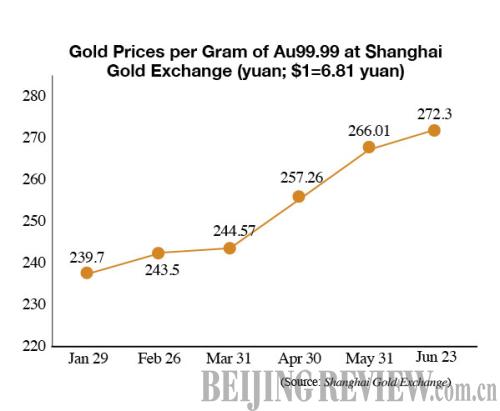| 
Numbers of the Week
$900.2 billion
China's holdings of U.S. Treasury securities rose by $5 billion in April to reach $900.2 billion, said the U.S. Treasury Department.
421.32 billion
The profits of China's centrally administered state-owned enterprises totaled 421.32 billion yuan ($61.9 billion) in the first five months of 2010, a rise of 76 percent from a year ago, said the State-Owned Assets Supervision and Administration Commission.
TO THE POINT: China's pledge to further reform the renminbi (yuan) exchange rate regime recently delivered a boost to Asian currencies and global stock markets. The central bank expanded its pilot program involving yuan settlement in foreign trade to include trade centers the world over. The National Audit Office revealed details about local government debts, raising concerns over a financial black hole. By setting up a stringent entrance threshold, China aims to clear up the crowded third-party payment industry. Financial pressure mounts on real estate developers, due to the recent housing market gloom. China will overtake Japan as the world's second largest advertising market within five years.
By HU YUE
China's Currency
China's renminbi exchange rate reform will be a gradual process, but its impact on the markets has already been felt.
The central parity of the renminbi (yuan) to the U.S. dollar reached 6.7980 on June 22, a substantial appreciation of 0.43 percent over the previous day, the highest since China unpegged the yuan to the U.S. dollar in July 2005, according to the China Foreign Exchange Trading System. But on June 23 the yuan slipped to 6.8102 against the U.S. dollar.
The People's Bank of China, the central bank, announced on June 19 that it will push forward renminbi exchange rate reform, but ruled out the possibility of a one-off revaluation.
The announcement boosted other Asian currencies against the dollar, and sent stock prices up around the world. On June 21, stock indexes in Hong Kong, Germany, Tokyo and France rose by between 1.6 percent and 3.1 percent. The benchmark Shanghai Composite Index closed up 2.9 percent as investors bid on stocks of Chinese airlines and metals firms, whose costs for imported fuel and iron ore would be lower if the yuan gains value.
The international community welcomed the reform. The move "will help increase Chinese household income and provide the incentives necessary to reorient investment toward industries that serve the Chinese consumers." said Dominique Strauss-Kahn, Managing Director of the International Monetary Fund.
Global Settlement
The central bank and several other related ministries announced on June 22 to expand the yuan settlement pilot program.
The regions where Chinese exporters can use the yuan to settle trade agreements will be extended from the original Association of Southeast Asian Nations (ASEAN) and Hong Kong and Macao to the rest of the world.
It also added 18 domestic regions to the program, including Beijing, Tianjin and Chongqing municipalities, and Liaoning, Jiangsu, Zhejiang, Fujian, Shandong, Hubei, Hainan, Yunnan, Sichuan, Jilin and Heilongjiang provinces, and Inner Mongolia, Guangxi Zhuang, Tibet and Xinjiang Uygur autonomous regions.
China introduced the trial program in July 2009 in an effort to reduce its reliance on the U.S. dollar to avert foreign exchange fluctuations, and also to increase the yuan's international importance.
Shanghai and four cities of Guangdong Province were the first places where foreign trade could be settled using the yuan.
Local Debt
The National Audit Office on June 23 made a report to the 15th session of the Standing Committee of the 11th National People's Congress, providing a fresh snapshot of local government debt.
Liu Jiayi, Auditor General of the National Audit Office, said in the report that 18 provincial, 16 city and 36 county-level governments audited were burdened with outstanding debts of 2.79 trillion yuan ($410 billion) by the end of 2009, including 1.04 trillion yuan ($152.3 billion) of debt in 2009 alone.
| 